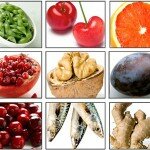Top 10: Best and Worst Anti-inflammatory foods
Posted on | April 23, 2012 | 1 Comment
Chronic inflammation of the cells in your body is though to cause some of the biggest health problems of the world today including Heart Disease, Diabetes and Cancer. The best news is that studies have proven that the risk of each of these are significantly reduced by changing our lifestyle and making better food choices.
Therefore, rather then spending a fortune on supplements at your local pharmacy, do it the natural way and eat more anti-inflammatory foods and decrease or cut out foods that are causing inflammation and you could be well on your way to improving your health outlook:
TOP 10 ANTI-INFLAMMATORY FOODS
1. Wild Alaskan Salmon: Salmon contains anti-inflammatory omega-3s (wild is better than farmed) and has been known to help numerous ailments. Try and incorporate oily fish into your diet twice weekly. If you don’t like fish, try a high quality fish oil supplement.
2. Kelp: High in fibre, this brown algae extract helps control liver and lung cancer, douses inflammation, and is anti-tumor and anti-oxidative. Good sources are Kombu, wakame and arame.
3. Extra Virgin Olive Oil: This oil provides a healthy dose of Omega-3 fats that fights inflammation, can help lower risks of asthma and arthritis, as well as protect the heart and blood vessels.
4. Cruciferous Vegetables: Broccoli, brussel sprouts, kale and cauliflower are all loaded with antioxidants. Also can provide detox naturally.
5. Blueberries: Blueberries contain anthocyanins which not only reduce inflammation, but can protect the brain from aging and prevent diseases, such as cancer and dementia. Organic berries are even better. You can also try cherries and strawberries which contain Anthyocyanins.
6. Turmeric: This powerful Asian spice contains a natural anti-inflammatory compound, curcumin, which is often found in curry blends. It is said to have the same effect as over-the counter pain relievers (but without their side effects).
7. Ginger: Helps reduce inflammation and control blood sugar. Drinking Ginger tea is also a great option.
8. Garlic: Though a little more inconsistent (in terms of research), garlic can help reduce inflammation, regulate glucose and help your body fight infection.
9. Green Tea: Contains anti-inflammatory flavonoids that may even help reduce the risks of certain cancers.
10. Sweet Potato: A great source of complex carbs, fiber, beta-carotene, manganese and vitamin B6 and C, these potatoes actually help heal inflammation in the body.
TOP 10 INFLAMMATORY FOODS
These foods have been linked to obesity, increased risks of numerous diseases and even death in some cases.
1. Sugar: Sugar is everywhere. Try and limit processed foods, desserts and snacks with excess sugar. Opt for fruit instead.
2. Common Cooking Oils: Sunflower, grapeseed, corn and cottonseed oils promote inflammation and are made with cheaper ingredients.
3. Trans Fats: Trans fats increase bad cholesterol, promote inflammation, obesity and resistance to insulin. They are in fried foods, fast foods, commercially baked goods, such as peanut butter and items prepared with partially hydrogenated oil, margarine and vegetable oil.
4. Dairy: While some yogurts are acceptable, dairy is hard on the body. Milk is a common allergen that can trigger inflammation, stomach problems, skin rashes, hives and even breathing difficulties.
5. Feedlot-Raised Meat: Animals who are fed with grains like soy and corn contain high inflammation. These animals also gain excess fat and are injected with hormones and antibiotics. Always opt for organic, free-range meats who have been fed natural diets.
6. Red and Processed Meat: Red meat contains a molecule that humans don’t naturally produce called Neu5GC. Once you ingest this compound, your body develops antibodies which may trigger constant inflammatory responses. Reduce red meat consumption and replace with poultry or fish. Eat lean cuts of red meat once a week at most.
7. Alcohol: Regular consumption of alcohol causes irritation and inflammation to numerous organs, which can lead to cancer.
8. Refined Grains: “Refined” products have no fibre and have a high glycemic index. They are everywhere: white rice, white flour, white bread, pasta, pastries. Try and replace with minimally processed grains.
9. Artificial Food Additives: Aspartame (E951) and MSG (E621) are two common food additives that can trigger inflammation responses. Try and omit completely from the diet.
10. Fill in the Blank: Do you constantly have headaches, feel tired or know you have a food intolerance? Sometimes, you may develop an allergy to a food and not even know it. Coffee, certain vegetables, cheese… there might be a trigger you aren’t even aware of. Try and take a few foods out to see how you feel and slowly incorporate them back in to see if there might be a hidden culprit lurking in your diet!
Related posts:
Pizza is so ‘moreish’ – you can never jus...
Bread based treats have well and truly infiltr...
I think all of us are probably guilty of not being...
I cannot believe it’s taken me this long to try TH...
Tags: anthocyanins help reduces diabetes > antioxidants in red wine > Best anti-inflammatory food > health blogs in singapore > how to reduce inflammation with diet > nutrition blog > what are anthocyanins > what are antioxidants > what are flavanoids > worst anti-inflammatory food;
Comments
One Response to “Top 10: Best and Worst Anti-inflammatory foods”
Leave a Reply
You must be logged in to post a comment.





May 1st, 2012 @ 12:43 am
This is a great synopsis of the best inflammatory and anti-inflammatory foods. I am a cosmetic surgery doctor from Mumbai, India and turmeric is an active everyday ingredient that is added to Indian cooking preparations to add color and taste. Turmeric is also actually an anti-inflammatory application that can be applied to small external wounds. It has the effect of immediately reducing the inflammation and speeds up clotting.
I really like your last point where you mention that omitting certain elements from your diet can help you understand the root cause of headaches and allergies. I realized that cutting out extra caffeine from my diet reduced my occasional headaches. This is an ideal way to find out the cause of certain persistent maladies without overtly popping pills and medicines and is a safe way of diagnosis.